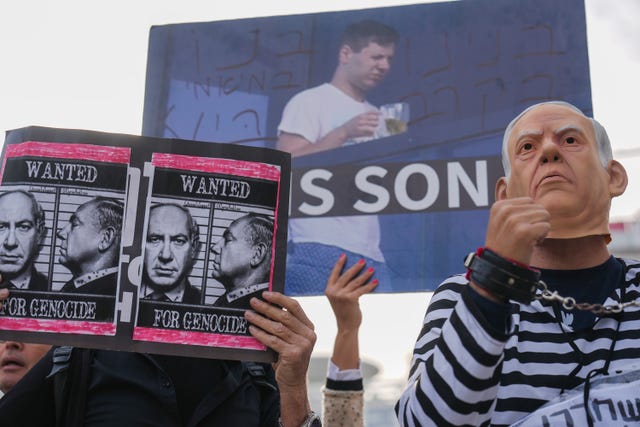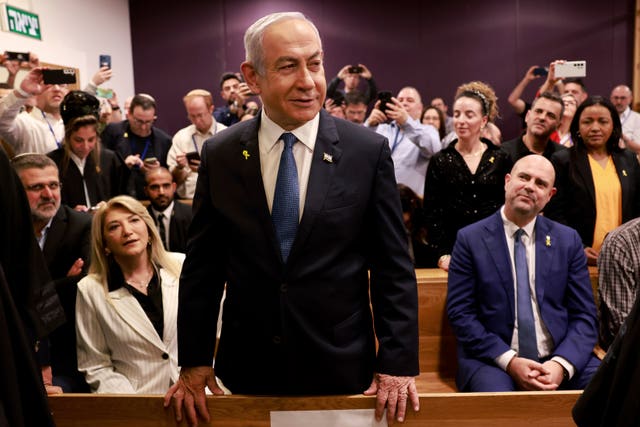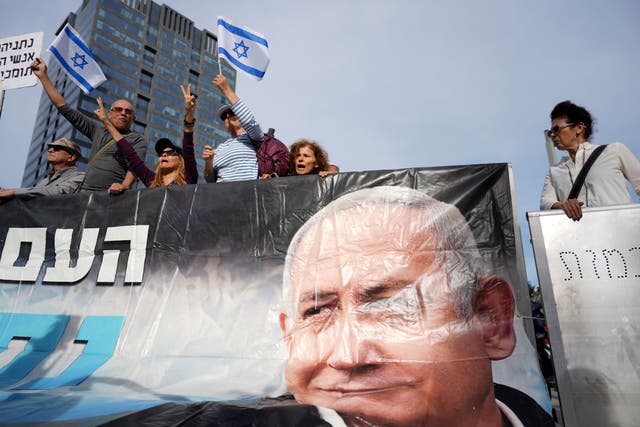Netanyahu vows to challenge ‘absurd’ corruption charges as he gives evidence
The Israeli Prime Minister is accused of fraud, breach of trust and accepting bribes.

Israeli Prime Minister Benjamin Netanyahu promised defiantly to refute the corruption allegations against him as he began giving evidence in his trial on Tuesday.
Mr Netanyahu is the first sitting Israeli leader to take the stand as a criminal defendant at the same time as he faces an international arrest warrant for war crimes allegations.
In a packed Tel Aviv courtroom, Mr Netanyahu portrayed himself as a dedicated leader and a defender of Israel’s interests, swatting away the charges against him as a “drop in the sea” compared to the challenges he has faced protecting his country.
“I waited eight years for this moment, to say the truth,” Mr Netanyahu said, adding that his evidence would “poke holes in the absurd accusations”.
The Prime Minister will answer during his appearances to charges of fraud, breach of trust and accepting bribes in three separate cases.
He is accused of promoting advantageous regulation for media moguls in exchange for favourable coverage of himself and his family.

The 75-year-old denies any wrongdoing, saying the charges are a witch hunt orchestrated by a hostile media and a biased legal system out to topple his lengthy rule.
The charges against Mr Netanyahu have cast another shadow over the country’s longest-serving leader and complicated his legacy. They have divided Israel, sparking protests and a political crisis over his fitness to serve under indictment.

The Prime Minister told his version of events and shared personal details about his life that he might hope would shape the judges’ perception of him.
He said at the start of his career he would lose sleep over media coverage but learned it had no meaningful bearing — in contrast to the prosecution’s attempts to paint him as image-obsessed.
He said he smoked cigars but could hardly finish them because of his workload, and hated champagne.
Earlier, Mr Netanyahu’s lawyer, Amit Hadad, accused the Israeli justice system of making up the charges in an effort to ensnare the Israeli leader.
“There was a huge effort … to find a few pieces of a puzzle that don’t connect to each other,” Mr Haddad said. “In court, in the light of day, we see everything falls apart.”
Giving evidence will take up a significant chunk of Mr Netanyahu’s working hours, prompting critics to ask if he can capably manage a country embroiled in a war on one front, containing the fallout from a second, and keeping tabs on other potential regional threats, including from Iran or the recent fall of Bashar Assad in Syria.

Under Israeli law, indicted prime ministers are not required to step down, but the charges against Mr Netanyahu cleaved deep divisions in Israel. Protesters have demanded that he resign and former political allies have refused to serve in government with the Israeli leader, triggering a political crisis that led to five elections in less than four years beginning in 2019.
Mr Netanyahu’s supporters view the charges as the result of bias and overreach by the justice system.
Despite the pressure, Mr Netanyahu has rejected calls to step down and has used his position as prime minister to lash out at law enforcement, media and courts.
The trial will be an inconvenient legal spectacle for the Israeli leader at a time when he is still fighting a war in Gaza with no end in sight and as he faces an international arrest warrant over Israel’s conduct during that conflict.





